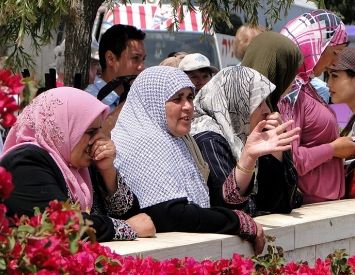The COVID-19 pandemic hasn't stopped Israel’s appetite for land confiscation, settlement building and demolition of Palestinian houses in the occupied West Bank while besieging the Gaza Strip, writes Dr Ibrahim Natil.
ISRAEL’S LARGE-SCALE demolition of Palestinian houses, settlement expansions and denial of international human rights activists’ visas have been taking place while claiming peace, security and normalisation with neighbours. On 30 October 2020, Michael Lynk, U.N. special rapporteur for the situation of human rights in the occupied Palestinian Territory, called on the international community to take action and move beyond condemnation to ensure accountability for Israel's human rights abuses and international law violations.
Demolition of properties and denial of entry
After two days of destroying the Bedouin village Khirbet Hamsa al-Foqa, near Tubas in the Jordan Valley, leaving its nearly 80 inhabitants homeless, the EU’s high representative for foreign affairs and security policy/vice-president commission condemned Israel’s action on 5 November 2020.
The Israeli forces destroyed more than 70 structures, including residential, livelihood and sanitation facilities, belonging to 11 Palestinian families with 41 children as the world watched the U.S. Election.
The EU, however, learned that there are currently 52 Palestinian schools under threat of demolition as their statement says:
‘This large-scale demolition confirms once again the regrettable trend of confiscations and demolitions since the beginning of the year. This comes on top of the threat of demolition of the Palestinian school in the Ras Al-Teen community in the central West Bank, which has been co-funded by the EU and several EU Member States.’
Israel behaves above the international law with a free hand, changing the de facto on the ground gradually. Israel does not listen to its partners from the EU and the international community calls for the protection of children, including ensuring their right to education in a safe and secure school environment.
Systemic measurements took place during the pandemic while Israel denied entry to the majority of staff for the United Nations Office of the High Commissioner for Human Rights (OHCHR) working in the Palestinian Occupied Territories. OHCHR spokesman Rupert Colville confirmed that nine out of 12 staff members have been made to leave Israel since August after their visas were not renewed.
Following Israel’s denial of the February publication of a blacklist of 112 companies operating in Israeli settlements in the West Bank, Michael Lynk criticised strongly the silence of the Security Council towards Israel’s actions:
“The international rule of law matters and, if we are to avoid the rule of the jungle, it must be obeyed. And if the rule of law matters, then so must accountability. If the Security Council is to speak with authority, then the disobedience of Council directions must have consequences.”
As these actions of destroying houses took place, building settlements have witnessed unprecedented record as the Peace Now watchdog group reported that more than 12,150 illegal Israeli settlement homes were approved this year, making 2020 one of the most prolific years for settlement expansionism.
Settlement expansion
Israel approved constructing more than 2,200 West Bank settlement housing units while entering a new era of regional peace treaties. This approval of new expansion by a “defence ministry planning committee” is part of a building boom during the Presidency of Donald Trump, a staunch ally of Israeli Prime Minister Benjamin Netanyahu.
The Palestinian Authority is powerless while Nabil Abu Rudeineh, a spokesman for Palestinian President Mahmoud Abbas, stated:
“The plan is against all international conventions and laws.”
Michael Lynk said:
“The international community observes, it sometimes objects, but it does not act.”
Israel continues to confiscate the land that is meant for the independent Palestinian State and “it is high time for accountability”.
On 16 October 2020, the foreign ministers of Europe’s five major powers – the UK, France, Germany, Italy and Spain – urged Israel to immediately stop its plans to build new settlements in the occupied Palestinian territories.
Jordan, however, condemned constructing 4,900 housing units in the occupied West Bank as the Jordanian Minister of Foreign Affairs and Expatriates tweeted on Friday 16 October 2020:
‘We condemn Israel’s decision to build 4,900 new settlement units in occupied West Bank. This decision and other illegal actions undermine the two-state solution and prospects for peace and are clear violation of International law. It is imperative world acts against them in protection of peace.’
How could “peace deals” work with settlements? What kind of peace? Does Israel test the water of its new partners in the Middle East by authorising building new settlements? Has Israel known the position of the new partners in advance? Would Israel want to say to all nations, governments and partners, we do not care about your position or condemnation?
Israel does not pay any consideration for EU-funded structures and the humanitarian impact of the current coronavirus pandemic on the Palestinian children and women. These developments are serious challenges and an impediment towards the so-called “two-state solution” and Israel implements the annexation plan silently and gradually.
Dr Ibrahim Natil is a lecturer at Dublin City University. He is a human rights campaigner and a Fellow at the Institute for International Conflict Resolution. You can follow Dr Natil on Twitter @Natilibrahim.
Related Articles
- Palestinian women most affected by COVID-19 and annexation
- Peaceful social organisations: Challenges of foreign occupation
- Civil society and the fight for a better Palestine
- The Fairfax press and the Gaza massacre Part II(a)
 This work is licensed under a Creative Commons Attribution-NonCommercial-NoDerivs 3.0 Australia License
This work is licensed under a Creative Commons Attribution-NonCommercial-NoDerivs 3.0 Australia License
Support independent journalism Subscribe to IA.















